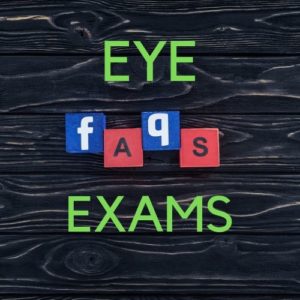FAQs About Your Eye Exams


Eye exam cost
The cost of an eye exam will vary by where you live and, perhaps, whether you have the exam performed by an optometrist (OD) or an ophthalmologist (MD). Another factor that determines cost is whether the exam is for contact lens fitting or glasses, and the number of different types of eye examinations that are included.
Eye exams for contact lenses always cost more than routine eye exams that check your eye health and update your eyeglass prescription. The extra cost for a contact lens exam ranges from $15 to $160 above regular comprehensive eye exam fees.
The range is so wide because there are many types of contact lenses that require special fitting and some contact lens exams include a computerized corneal topography exam to determine the shape of your cornea. The computerized corneal topography exam will also reveal if dry eye is causing blurry vision and where on your corneas the dryness is most extreme.
A standard eye exam will include the evaluation of your vision using an eye chart, but eye charts don’t measure your peripheral vision, depth perception, color perception, your ability to perceive contrast, or the health of the interior of your eye. Separate tests are required for those evaluations.
Be sure to ask what tests will be included in your eye exam. Some ads may list very low-priced eye exams, but then charge you extra to have your pupils dilated so your retinas and the interior of your eyes can be examined or charge extra for glaucoma screening.
A comprehensive eye exam should always include an eye pressure test for glaucoma and a slit lamp exam to evaluate the health of the interior of your eye—the lens, cornea, retina, and optic nerve.
How often should you have your eyes examined?
Most eye care professionals recommend that you have a comprehensive eye exam every one to two years. For adults age 18 to 60 the standard recommendation is to have a comprehensive eye exam every two years. Adults age 61 and older should have annual exams. If you fall into a risk category your eye doctor may recommend more frequent eye exams.
Risk categories include:
- A family history of eye diseases such as glaucoma or macular degeneration
- Diabetes or high blood pressure
- Prescriptions that may have eye-related side effects
- Previous eye injuries or eye surgery


